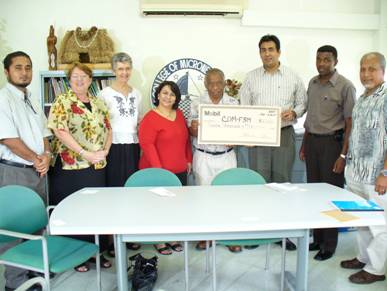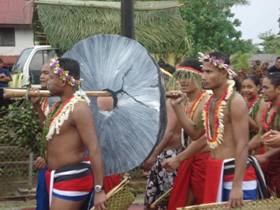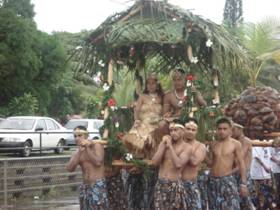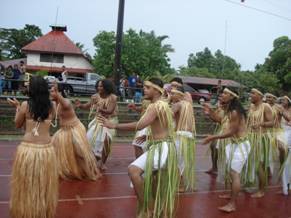 |
College of Micronesia-FSM Federated States of Micronesia |
|
| Computing · Directory · Home · Jobs · Library · News |
| April - Palikir, Pohnpei | ||||
M E M O R A N D U M April 18, 2007 To: All Concerned From: President, COM-FSM Subject: Update #291 Accreditation The College of Micronesia-FSM submitted its Focused Mid-Term Report, a three years report after the Accreditation Reaffirmation Visit in March 2004, to Western Association of Schools and Colleges (WASC) on March 14, 2007. An acknowledgement of the receipt of the Focused Mid-Term Report by WASC has been received by President's Office on April 4, 2007. The acknowledgement letter also informed the College that the Commissioners will be reviewing the report at their meeting in June 2007 to determine if they will accept the report or not. The College has also submitted its Annual Report to WASC on April 16, 2007. Board of Regents The Board of Regents recently met in Chuuk State during the week of March 26-27, 2007. The actions and directives from the Board meeting in Chuuk are attached for your information. Board of Regent members also met with faculty, staff, and students during their meeting in Chuuk and the following concerns/problems were expressed to members: need more programs to be offered at Chuuk Campus, need to improve dispensary services, timely arrival of textbooks, processing of transcript requests are too slow, do not know where to get assistance on supplies request, need more third year program courses to be extended to Chuuk Campus, need aircons in classrooms, and transportation problems. The next Board of Regents meeting will be in Pohnpei during the third week of May 2007. President's Retreat 2007 The college hosted over 115 participants in the 2007 President's Retreat held at the FSM China Friendship Sports Center from March 19 – 23, 2007. The participants included representative from all six college campuses plus key national and state stakeholders. Three main questions were addressed at the Retreat:
President's welcoming remarks In his opening remarks President James stressed a number of key areas.
Retreat design The Retreat was designed to be highly interactive with presentations being used to set the stage for in-depth discussions. A key concept was to develop shared understanding of where the college is right now and what factors and trends are influencing the college and what are key issues and problems facing the college. The last stage of the Retreat was to address priority problems and challenges facing the college leading to action plans and implementation. To assist with promoting discussion and dialoguer participants were encouraged to use a series of simple tools.
The Retreat also included discussion sessions that were directed at addressing specific issues:
Problem statements and strategies to address those problems Based on extensive review of the data, evidence and trends affecting the college a set of problem statements were generated along with SWOT analysis of the college. Key strategies and action steps to address major issues facing the college were also developed.
include all necessary internal and external stakeholders. The college needs to:
Follow up and implementation Follow up on the Retreat has already started with presentations to the BOR in its March 2007 meeting in Chuuk and training/briefing/discussions with Chuuk campus faculty, staff and students on the Retreat and immediate implementation of key strategies including a communications plan to implement the communications policy adopted by the Board and implementation of the Shared Governance Policy. A college wide action plan is being developed based on the results of the Retreat. Additionally, individual campus and department/division/program plans will also need to be developed. For more information including copies of presentations, working sessions and results/recommendations of the Retreat, do not hesitate to contact the offices of the President, the Vice President for Administration, and Institutional Research and Planning. Mobil Oil Micronesia Donates Money to College's LRC and Annual Fun Walk: Mobil Oil Micronesia, Inc. presented to President James on April 12, 2007, a monetary contribution of $12,000 from the Scholarship Foundation to the College of Micronesia-FSM. The gift to COM-FSM will assist the College to increase reading materials and procure computer equipment for the student of COM-FSM and the community of Pohnpei. In addition to the $12,000 contribution, Mobil Oil Micronesia, Inc. donated $2,500 to support and annual COM-FSM Fun Run Walk event scheduled for May 5, 2007. "Mobil Oil Micronesia, Inc., recognizes that education is the foundation for the future our community. We hope that the gift provided will enhance the learning environment for the students at the COM-FSM and our community who utilizes the COM-FSM Library. " said Kamal Singh, President, Mobil Oil Micronesia, Inc. "Our objective is to be able to provide financial assistance to educational institutes to enhance the educational environment of the schools in the region through educational learning materials, i.e. books and equipment, and school facilities, i.e. classrooms and libraries, for our children, the future leaders of the communities we operate in" said Singh. Mobil Oil Micronesia, Inc. has been a member of the business community for over 40 years and has contributed monetary and in-kind donations annually to various educational institutes, health, safety and environmental organizations in Micronesia. President James represented the key cabinet members at the at the turn over of the funds ceremony and thanked President Kamal Singh for their donations and generosity to the College.
COM-FSM Founding Day: The College of Micronesia-FSM National Campus celebrated its Founding Day, April 1, 1993, on April 2, 2007, by having students from different islands and states in the FSM showcasing their cultures by performing traditional dances and floats reflecting their life styles. The College has included in its priority goals a goal to promote the uniqueness our community, cultivate respect for individual differences and champion diversity. The cultural day activities will be part of the Founding Day celebrations that is going to be done every other year. The photos shown below were taken at the 2007 Founding Day.
Trio Programs Leadership Conference College Visit 2007 The College of Micronesia-FSM Campus will be the venue for the Trio Leadership Conference College Visit 2007. Over 200 Trio Programs (Talent Search, Upward Bound and SSP) From the four FSM States and the Republic of Marshall Islands will be attending this conference during the week of April 16-19, 2007. The organizing committee for the conference has organized the following activities and sessions for the participants during the week: sports competition, college orientation, courtesy visits, site visits to historical sites and other sites in Pohnpei, cultural presentations, leadership, world finances, climate change, and other presentations that will keep the participants busy during the week. The College's administration expresses its appreciation and thanks to the organizing committee members, presenters, and all sponsors of this conference. Thank you. |



